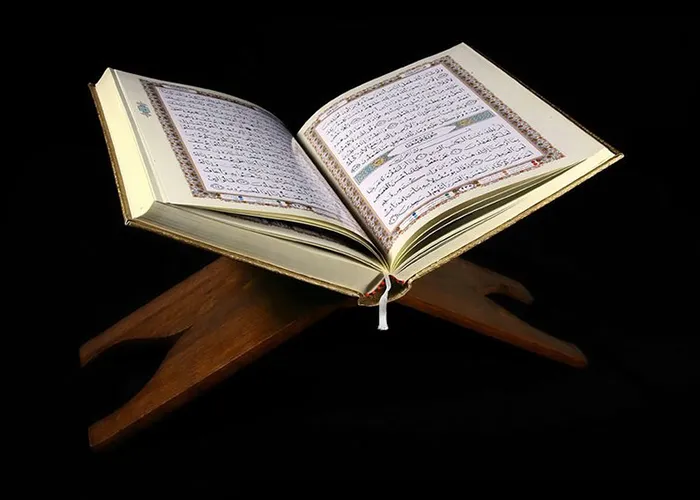Ayah Of The Week – Volume01 Issue22
Quranic Role Models: Women as Exemplars for All of Humanity
In Western societies, many women aspire to emulate men, often perceiving them as dominant figures in societal structures where power is disproportionately held by men. This dynamic has, unfortunately, contributed to widespread violence and discrimination against women. According to United Nations statistics, one-third of women globally experience violence at the hands of men.
In stark contrast to this paradigm, the Quran not only refrains from positioning men as role models for women but elevates righteous women as role models for both men and women. It urges all of humanity to learn from these exemplary women and follow in their footsteps.
The Quran presents two notable examples in Surah Al-Tahrim (66:11-12), where women are lauded for their faith, resilience, and moral integrity:
Verse 11:
“وَضَرَبَ اللَّهُ مَثَلًا لِلَّذِينَ آمَنُوا امْرَأَتَ فِرْعَوْنَ إِذْ قَالَتْ رَبِّ ابْنِ لِي عِنْدَكَ بَيْتًا فِي الْجَنَّةِ وَنَجِّنِي مِنْ فِرْعَوْنَ وَعَمَلِهِ وَنَجِّنِي مِنَ الْقَوْمِ الظَّالِمِينَ“
“And Allah presents an example of those who believe: the wife of Pharaoh, when she said, ‘My Lord, build for me near You a house in Paradise and save me from Pharaoh and his deeds and save me from the wrongdoing people.'”
Verse 12:
“وَمَرْيَمَ ابْنَتَ عِمْرَانَ الَّتِي أَحْصَنَتْ فَرْجَهَا فَنَفَخْنَا فِيهِ مِنْ رُوحِنَا وَصَدَّقَتْ بِكَلِمَاتِ رَبِّهَا وَكُتُبِهِ وَكَانَتْ مِنَ الْقَانِتِينَ“
“And [the example of] Mary, the daughter of Imran, who guarded her chastity, so We breathed into her [a part] of Our spirit, and she believed in the words of her Lord and His scriptures and was of the devoutly obedient.”
These verses highlight the Quran’s profound reverence for women, presenting them as paragons of virtue for all humanity. Over 1,400 years ago, the Quran explicitly recognised women in roles of spiritual leadership and moral excellence, a recognition that remains groundbreaking even in contemporary discussions on women’s rights.
These verses offer transformative lessons for various groups in society, discussed below:
Messages for Adolescents and Young Adults
1. Righteousness Transcends Gender
The Quran teaches that moral excellence is not defined by gender but by piety and closeness to Allah SWT. Whether male or female, individuals who embody these values become exemplars for humanity. Young people should aim to develop their spiritual character rather than be confined by societal stereotypes of success based on gender.
2. Seek Quranic Role Models Over Western Ideals
Instead of imitating Western or secular role models often rooted in superficial or materialistic values, young people are encouraged to look to the examples of women like Fatemeh, the daughter of Prophet Muhammad (PBUH), Zainab, the daughter of Imam Ali (AS), Asiya, the wife of Pharaoh, and Maryam (Mary), daughter of Imran. These women exemplified qualities like courage, chastity, and unwavering faith, standing firm in their convictions despite adversity.
3. Recognise True Strength and Resilience
These women demonstrated profound strength—not through physical dominance but through spiritual resilience, moral clarity, and an unshakable connection to Allah SWT. This is the strength worth aspiring to, regardless of gender.
Messages for Parents
1. Introduce Quranic Role Models
Parents should actively teach their children about the inspiring stories of women like Fatemeh, Zainab, Asiya and Maryam. By narrating their lives, parents can instil values of integrity, devotion, and resistance against oppression. This helps children, especially daughters, understand that they are capable of achieving greatness through their faith and moral character.
2. Foster Gender Equality in Moral Excellence
Parents should emphasise to their children that men and women are equally capable of attaining spiritual leadership. Highlighting Quranic role models as examples ensures that daughters grow up with a sense of empowerment, and sons learn to respect and honour women’s contributions to society.
Messages for Imams and Cultural Leaders
1. Teach Values That Empower Women
Imams and leaders should promote the virtues highlighted in these verses, which women and girls can embody to become role models within their communities. These include:
-
- Chastity and Modesty (“أَحْصَنَتْ فَرْجَهَا“)
- Resistance to Oppression (“نَجِّنِي مِنَ الْقَوْمِ الظَّالِمِينَ“)
- Prioritising Eternal Rewards Over Worldly Gains (“رَبِّ ابْنِ لِي عِنْدَكَ بَيْتًا فِي الْجَنَّةِ“)
- Truthfulness (“صَدَّقَتْ بِكَلِمَاتِ رَبِّهَا“)
- Obedience to Allah’s Commands (“كَانَتْ مِنَ الْقَانِتِينَ“).
Teaching these values helps foster a generation of women who embody Quranic ideals and men who honour these qualities.
2. Counter Negative Stereotypes About Islam and Women
Imams should actively counter misconceptions, both within and outside the Muslim community, about Islam’s stance on women. While some cultural practices misrepresent Islam by limiting women’s rights, the Quran elevates women to roles of leadership and moral excellence. Imams should challenge these distortions and emphasise that Islam honours women as equal contributors to spiritual and social progress.
3. Promote the Universal Relevance of Quranic Values
Imams can highlight how the stories of Asiya and Maryam remain universally relevant, offering guidance on resisting tyranny, valuing integrity, and upholding faith. By doing so, they can inspire both men and women to align their lives with Quranic principles.
Additional Messages for All
- Defy Social Expectations When Necessary
Asiya chose to stand against the tyranny of her husband, Pharaoh, prioritising her faith and moral principles over the luxuries of a worldly life. This teaches us to remain steadfast in righteousness, even when societal pressures discourage it.
- The Power of Faithful Women as Leaders
Maryam’s devout obedience and her role in carrying divine revelation illustrate that leadership in faith is not gendered. Men and women alike can find guidance and inspiration in her unwavering devotion and trust in Allah SWT.
These Quranic examples showcase a vision of respect for women that transcends time and cultural barriers. By looking to Asiya and Maryam as role models, individuals from all walks of life—whether men or women—can aspire to embody the values of faith, courage, and integrity, becoming beacons of righteousness in their communities. Through these timeless lessons, the Quran underscores the universal message that greatness is achieved not through gender but through faith and moral excellence.
news via inbox
Subscribe to the newsletter.




